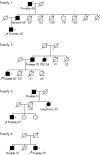A large germline deletion in the Chek2 kinase gene is associated with an increased risk of prostate cancer
- PMID: 17085682
- PMCID: PMC2563179
- DOI: 10.1136/jmg.2006.044974
A large germline deletion in the Chek2 kinase gene is associated with an increased risk of prostate cancer
Abstract
Background: Germline mutations in the Chek2 kinase gene (CHEK2) have been associated with a range of cancer types. Recently, a large deletion of exons 9 and 10 of CHEK2 was identified in several unrelated patients with breast cancer of Czech or Slovak origin. The geographical and ethnic extent of this founder allele has not yet been determined.
Participants and methods: We assayed for the presence of this deletion, and of three other CHEK2 founder mutations, in 1864 patients with prostate cancer and 5496 controls from Poland.
Results: The deletion was detected in 24 of 5496 (0.4%) controls from the general population, and is the most common CHEK2 truncating founder allele in Polish patients. The deletion was identified in 15 of 1864 (0.8%) men with unselected prostate cancer (OR 1.9; 95% CI 0.97 to 3.5; p = 0.09) and in 4 of 249 men with familial prostate cancer (OR 3.7; 95% CI 1.3 to 10.8; p = 0.03). These ORs were similar to those associated with the other truncating mutations (IVS2+1G-->A, 1100delC).
Conclusion: A large deletion of exons 9 and 10 of CHEK2 confers an increased risk of prostate cancer in Polish men. The del5395 founder deletion might be present in other Slavic populations, including Ukraine, Belarus, Russia, Baltic and Balkan countries. It will be of interest to see to what extent this deletion is responsible for the burden of prostate cancer in other populations.
Conflict of interest statement
Competing interests: None.
References
-
- Chaturvedi P, Eng W K, Zhu Y, Mattern M R, Mishra R, Hurle M R, Zhang X, Annan R S, Lu Q, Faucette L F, Scott G F, Li X, Carr S A, Johnson R K, Winkler J D, Zhou B B. Mammalian Chk2 is a downstream effector of the ATM‐dependent DNA damage checkpoint pathway. Oncogene 1999184047–4054. - PubMed
-
- Bell D W, Varley J M, Szydlo T E, Kang D H, Wahrer D C R, Shannon K E, Lubratovich M, Verselis S J, Isselbacher K J, Fraumeni J F, Birch J. Li FP, Garber JE, Haber DA. Heterozygous germ line hCHK2 mutations in Li‐Fraumeni syndrome. Science 19992862528–2531. - PubMed
-
- Vahteristo P, Tamminen A, Karvinen P, Eerola H, Eklund C, Aaltonen L A, Blomqvist C, Aittomaki K, Nevanlinna H. p53, CHK2, and CHK1 genes in Finnish families with Li‐Fraumeni syndrome: further evidence of CHK2 in inherited cancer predisposition. Cancer Res 2001615718–5722. - PubMed
-
- CHEK2 Breast Cancer Consortium. Low‐penetrance susceptibility to breast cancer due to CHEK2*1100delC in noncarriers of BRCA1 or BRCA2 mutations. Nat Genet 20023155–59. - PubMed
Publication types
MeSH terms
Substances
LinkOut - more resources
Full Text Sources
Medical


